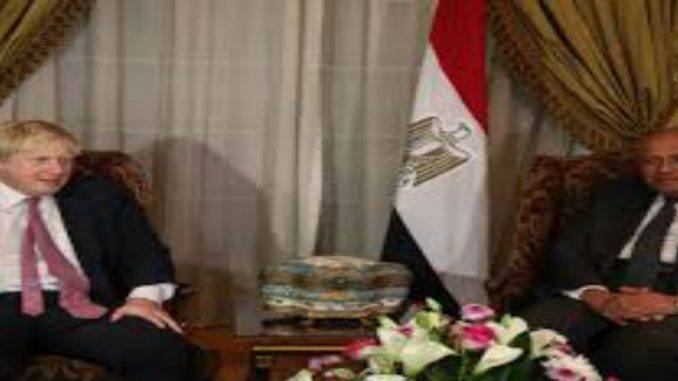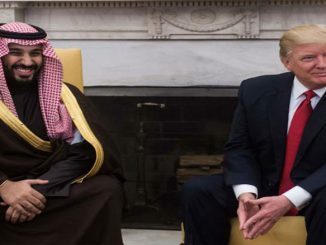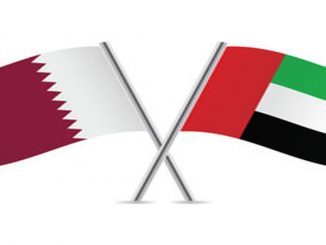
Despite Britain’s economic support to Egypt during UK Foreign Minister’s visit to Cairo,as Britain and Egypt completed a $150 million loan guarantee agreement to help Egypt complete its program of economic reforms,but there were no signs for the resumption of flights to Sharm al-Sheikh in the coming period.
As a result, Egypt expressed frustration at Britain’s refusal to lift a suspension of flights from the United Kingdom to the Red Sea resort of Sharm al-Sheikh, imposed after Islamic State brought down a Russian airliner in 2015,according to Reuters.
The issue of airline security came up in talks involving visiting British Foreign Minister Boris Johnson, Egypt’s Abdel Fattah al-Sisi and Foreign Minister Sameh Hassan Shoukry.
According to a British statement, Johnson praised Egypt as a longstanding friend of Britain and said they were strong allies against terrorism and extremist ideas.
“But Shoukry said Britain’s continued suspension of flights to Sharm al-Sheikh, once a popular destination for British holidaymakers, was unjustified,”said Reuters.
In response Egyptian foreign ministry statement said,”The continuation of the halt of the British airline to the Egyptian tourist destinations despite the progress that has been made in securing airports is completely not understandable and unjustified.”
The flight suspension was hitting Egypt’s economy hard and was “inconsistent with Britain’s repeated promises to support Egypt”, the statement said.
There is no doubt that Britain’s stance have caused a great disappointment to the Egyptian regime,especially that it came days after Russia’s Minister of Transport Maxim Sokolov comments on the air with Rossiya 24 TV Channel, saying that the Russian aviation experts did not make definite conclusions regarding quick resumption of air traffic with Egypt.
The Russian minister said, “A team of specialists and experts arrived from Cairo has not yet reached a firm conclusion that we will be ready to resume the air traffic to Cairo in near future.”
Sokolov added, Egyptian authorities need to focus on working with the staff in national airports.
He said, “The most important point our Egyptian colleagues need to focus on now is work with the staff supervising the aviation security and monitoring access to the air side and to the airport on the whole.”
Russia started its inspection over Cairo airports after a Russian Metro jet flight crashed in Sinai Peninsula shortly after taking off from Sharm El-Sheikh International Airport on 31 October 2015, resulting in the death of all 224 passengers and crew on board.
Sinai Province, an affiliated group to the Islamic State (ISIS), claimed responsibility for downing the Russian flight.
As a result, Russia suspended passenger flights to Egypt shortly after the crash.
Last week, a shoulder-fired anti-aircraft missile launcher lying in a heap of rubbish next to Cairo’s main international airport was allegedly found by an Egyptian man, according to The Telegraph(British newspaper).
Ibrahim Yousry, an Egyptian, said that he found an SA-7 missile launcher on the side of the road around a mile north of Cairo International Airport as he was heading to work.
In fact, the weapon has a maximum range of around 2.5 miles and so it could be used at that distance to strike a plane as it landed or took off.
Mr. Yousry wrote on his Facebook account, “The airport is not far away and it could cause disasters if it was placed here for a reason,” he added, “The airplanes here are an easy target because they fly at very low altitude and this is the best position for this weapon to be used.”
The weapon did not appear to be loaded with a missile, according to Mr. Yousry.
In this context, the executive director of Conflict Armament Research (CAR), James Bevan examined photographs of the launcher at the request of The Telegraph.
It was impossible to tell if the weapon was real based on a social media photograph but that it looked like an SA-7, a common portable anti-aircraft weapon, according to Mr. Bevan.
SA-7 version is manufactured in Egypt and many such weapons flooded out of neighboring Libya after the fall of the Qaddafi regime in 2011.
The Telegraph added, “It is impossible to know how the weapon ended up near the airport but the worst fear of Egyptian and Western intelligence is that it was planted by ISIS Egyptian affiliate, (Sinai Province) Wilayat Sinai, to be used in an attack on an aircraft.”
Egypt strives to restore tourism in the country to revive its wrecked economy.
Egypt’s tourism is one of the major sources of foreign currency in the country, that suffers from an economic crisis due to the shortage of foreign currency. The number of tourists fell 40% in the first quarter of 2016.
Tourism revenues have fallen as result of security instability in Egypt after the military coup in 2013 against Egypt’s first democratically elected President Mohamed Morsi.
Last January, Tarek Amer, the governor of the Central Bank of Egypt (CBE) told a parliament’s economic committee that foreign exchange revenues from tourism has declined from $11 billion in 2011 to $3.4 billion in 2016.
http://www.reuters.com/article/us-egypt-britain-flights-idUSKBN1640SY



